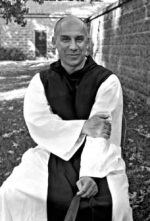
Yesterday, inspired by a final exam for Christian Devotional Classics (Evangelical Seminary), I kicked off a series on Receiving from the Christian Devotional Classics with a post on Thomas Merton & the Desert Fathers. Before going further with the series I thought that it would be helpful to wrestle with the question, “What is a Christian Devotional Classic?”
Maybe this reminds you of the larger conversation regarding What IS a Christian Book? (A Working Definition), a topic we broached when launching The Best Christian Book of All Time March Madness.
A Christian book is written with the intention (explicit or implicit) of expressing Christian truth (that is, truth drawn from God’s revelation through Scripture, Christ, and the Spirit) and in such a way that a reader can participate in this truth. — Micheal Hickerson. What IS a Christian Book? (A Working Definition). Emerging Scholars Network Blog. 3/13/2013.
But this is more focused. Before reading further, I encourage you to take a few minutes to write a draft/rough definition (or framework) of your own, give a representative title (or two), and briefly consider “Why bother with and how to interact with Christian Devotional Classics?” Bonus: What one Christian Devotional Classic do I desire to incorporate into my fall reading list?
In the introductory class to Christian Devotional Classics, Laurie Mellinger, Ph.D. (Associate Professor of Spiritual Formation and Christian Theology, Dean of Academic Programs) offered several frameworks for our consideration. I particularly appreciated this summary from James A. Wiseman, O.S.B. (Ordinary Professor of Spirituality, The Catholic University of America)*:
- classic is something that endures because it continues speaking to people,
- or illustrates a new way of looking at something (paradigm shift),
- whose meaning is so deep that it is not easily exhausted,
- but may not always be easy to read (language, translation, historical and cultural issues).
- Point: these classics are, for the most part, well-written; they express deep truths about the Christian life, generally drawn from the experience of suffering; we all ourselves to interact with their work, and apply their insights (and ours) to our lives by God’s grace.
- BUT “not every saint is to be imitated in every respect”!
![The Crucifixion; Jesus dies on the cross JESUS MAFA. The Crucifixion; Jesus dies on the cross, from Art in the Christian Tradition, a project of the Vanderbilt Divinity Library, Nashville, TN. http://diglib.library.vanderbilt.edu/act-imagelink.pl?RC=48390 [retrieved March 8, 2013].](https://blog.emergingscholars.org/wp-content/uploads/2013/03/Mafa058-medium.jpg)
- “We are heirs of a two-thousand-year treasury of Christian devotional writing.” (257)
- “They acquaint us with the major movements of Christian spirituality.” – patristic, medieval, Orthodox, Reformation, Roman Catholic, charismatic—“If we dismantle [our] faulty and uncharitable stereotypes of other Christian traditions, we may find ourselves wonderfully alert to hear what God’s Spirit has spoken to His servants through the centuries.” (257)
- We receive “great personal blessing’via the writings of spiritually wise men and women’. We read devotional books to be fed by Spirit-illumined writers who struggled to understand growth in the Spirit.” (258)
- “The Spiritual classics challenge our culturally shaped perspectives on the faith.” “C.S. Lewis notes that our age, like every age, suffers blind spots, distorting our perspective on reality. ‘The only palliative is to keep the clean sea breeze of the centuries blowing through our minds, and this can be done only by reading old books.’” [C.S. Lewis, “Introduction” to St. Athanasius, The Incarnation of the Word of God (New York: Macmillan, 1946), 6, cited in Demarest, 258.]
- Wesley thought it was a good idea: “In 1750 he published a fifty-volume series entitled The Christian Library’ Wesley testified that these writings led him to deeper devotion to Christ and to a more serious pursuit of the spiritual path.” (259)
AND Mellinger’s additional point:
We are commanded to remember (as were the Hebrew people before us [teach these things to your children’])—a brief Bible search turned up 161 references for “remember,” including 29 in the Psalms alone—a rationale for studying the classics!
For the class we read a number of pieces (full and excerpted). This curriculum project series focuses upon the ones which we read in their entirety:
- Thomas Merton (1915 – 1968). Wisdom of the Desert: Sayings of the Desert Fathers of the Fourth Century (1960).
- Receiving from the Christian Devotional Classics: Thomas Merton & the Desert Fathers (Thomas B. Grosh IV. ESN Blog. 8/8/2013)
- St. Benedict of Nursia (c. 480 – 543 or 547). The Rule of Saint Benedict (530).
- Christian Devotional Classics: The Rule of St. Benedict (Thomas B. Grosh IV. ESN Blog. 8/11/2013)
- The Way of a Pilgrim And the Pilgrim Continues His Way (1884). Note: A 19th-century Russian work of which the author is unknown.
- Christian Devotional Classics: The Way of a Pilgrim (Thomas B. Grosh IV. ESN Blog. 8/18/2013)
- St. Aelred of Rievaulx (1110 – 1167). Spiritual Friendship (1164-67).
- Christian Devotional Classics: Spiritual Friendship (Thomas B. Grosh IV. ESN Blog. 8/25/2013)
- Thomas à Kempis (c. 1380 – 1471). The Imitation of Christ (ca.1418-1427).
- Christian Devotional Classics: The Imitation of Christ (Thomas B. Grosh IV. ESN Blog. 9/1/2013)
- Julian of Norwich (1342-c.1416). Revelations of Divine Love (1413).
- Christian Devotional Classics: Revelations of Divine Love (Thomas B. Grosh IV. ESN Blog. 9/8/2013)
- Martin Luther (1483-1546). A Simple Way to Pray (1535).
- Christian Devotional Classics: Martin Luther (Thomas B. Grosh IV. ESN Blog. 9/15/2013)
- Saint Ignatius of Loyola (1491 – 1556). Spiritual Exercises (1522 to 1524). — Although the syllabus indicates that only excerpts of Spiritual Exercises were assigned for the class, I read fully in preparation for a class presentation.
- Christian Devotional Classics: Ignatius of Loyola (Thomas B. Grosh IV. ESN Blog. 9/22/2013)
- Brother Lawrence of the Resurrection (c. 1614 – 1691). The Practice of the Presence of God – The Best Rule of Holy Life. Note: Compiled after Brother Lawrence’s death by his friend Father Joseph de Beaufort, later vicar general to the Archbishop of Paris.
- Christian Devotional Classics: Brother Lawrence of the Resurrection (Thomas B. Grosh IV. ESN Blog. 9/29/2013)
- John Wesley (1703 – 1791). Plain Account of Christian Perfection (1766).
- Christian Devotional Classics: Christian Perfection (Thomas B. Grosh IV. ESN Blog. 10/6/2013)
- Thomas Raymond Kelly (1893 – 1941). A Testament of Devotion (1941).
- Christian Devotional Classics: A Testament of Devotion (Thomas B. Grosh IV. ESN Blog. 10/13/2013)
- A.W. Tozer (1897 – 1963). The Pursuit of God (1948).
- Christian Devotional Classics: The Pursuit of God (Thomas B. Grosh IV. ESN Blog. 10/20/2013)

If you are interested in a Christian Devotional Classics list, I recommend Renovare’s 100 Enduring Spiritual Classics (scroll to the end of the November 2000 newsletter, PDF), which was inspired by John Wesley’s A Christian Library. I appreciate that due to the Church History approach to Christian Devotional Classics, Mellinger provided a version of Renovare’s list in historical/chronological order.
To wrap-up, below are a few questions which Mellinger offered our class as lens for approaching a spiritual classic.**
- From what period of history does this classic come? What was happening in the church at that time that is reflected in the text of this work? Is there anything in the contemporary church that is similar? What was the author’s point of view on the subject(s)? Is it helpful for our situation today?
- In what ways can we profitably imitate this author? In what ways should we be cautious about doing so, and why?
- Given what you know about the author’s personal history, how did his or her experiences color his or her vision of the spiritual life?
- What is the most important point the author made? Why do you believe that it is so important?
- What is the most puzzling assertion that the author promulgated? Why did you wonder about it?
- What one question would you most like to ask the author of this work, and why?
- What assumptions can you find implicit in the author’s approach to his or her topic? Alternatively, what assumptions did you discover that you brought to the text? Were they challenged or confirmed?
- If you could have written one of the discussion questions for this text, what would it have been?
That’s all for now. Please share not only your comments, but also your insights to help fill out (and even correct material). Yes, I consider this a work in progress. To God be the glory!
*Co-editor with Louis Dupre of a text used in Christian Devotional Classics, i.e., Light from Light: Anthology of Christian Mysticism (Second Edition). Paulist Press. 2001.
** Bonus: Another list of questions, called “Interrogating the Text” (Alister E. McGrath, Christian Spirituality: An Introduction. Wiley-Blackwell,1999 pp. 138-9):
- Who is the author?
- For whom was the text written.
- What is the historical and cultural context of the work?
- What biblical imagery does the work employ?
- What does the writer want me to think?
- What does the writer want me to do?
- What can I take away from my engagement with the text?
Revised: 8/9/2013, 5:40 pm. Updated: 8/11/2013, 4:26 pm. Added Thomas Raymond Kelly‘s A Testament of Devotion to the book list: 8/11/2013, 7:31 PM.
Tom enjoys daily conversations regarding living out the Biblical Story with his wife Theresa and their four girls, around the block, at Elizabethtown Brethren in Christ Church (where he teaches adult electives and co-leads a small group), among healthcare professionals as the Northeast Regional Director for the Christian Medical & Dental Associations (CMDA), and in higher ed as a volunteer with the Emerging Scholars Network (ESN). For a number of years, the Christian Medical Society / CMDA at Penn State College of Medicine was the hub of his ministry with CMDA. Note: Tom served with InterVarsity Christian Fellowship / USA for 20+ years, including 6+ years as the Associate Director of ESN. He has written for the ESN blog from its launch in August 2008. He has studied Biology (B.S.), Higher Education (M.A.), Spiritual Direction (Certificate), Spiritual Formation (M.A.R.), Ministry to Emerging Generations (D.Min.). To God be the glory!

Leave a Reply